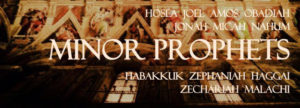Lately, I’ve been doing some studying in the Minor Prophets. Many of us know bits and pieces from some of these books, but we often lack knowledge about the specifics of each book. When did that prophet live and speak to God’s people? Were they prophesying to Israel or Judah? Were they pre- or postexilic? What were the specific issues they were addressing? Unfortunately, the only passages that are heard with any regularity in the corporate setting of the church are those that deal with Christ’s first Advent (think Micah 5:2) or when there’s the need for a sermon on giving (think Malachi 3:10). There may be a few other passages sprinkled about that are popular by themselves (think Zephaniah 3:17, Micah 6:8, Amos 5:24, or Habakkuk 2:8). I’m excited to be starting a sermon series after Easter in Haggai that will challenge us about our Kingdom priorities, and I’m thankful for a congregation that is hungry for the Word.
 There are numerous reasons why we don’t like to spend as much time in the prophets. The nature of Hebrew poetry can be a little challenging sometimes, so we might not initially understand what the prophet is communicating to us. Historical narratives and the epistles of the New Testament can be much more straightforward, so we may be tempted to simply “camp out” there. Another reason why the prophets can be off-putting is because we don’t fully understand the culture, geography, and geopolitical issues in which the ancient Israelites existed. The prophets will often make reference to a place or people that are not familiar to us, and so we miss a deeper understanding of the text.
There are numerous reasons why we don’t like to spend as much time in the prophets. The nature of Hebrew poetry can be a little challenging sometimes, so we might not initially understand what the prophet is communicating to us. Historical narratives and the epistles of the New Testament can be much more straightforward, so we may be tempted to simply “camp out” there. Another reason why the prophets can be off-putting is because we don’t fully understand the culture, geography, and geopolitical issues in which the ancient Israelites existed. The prophets will often make reference to a place or people that are not familiar to us, and so we miss a deeper understanding of the text.
Yet I think one of the strongest reasons we avoid the prophets’ books in the Old Testament is because it can be easy to see ourselves in those ancient Israelites. We know that they were a stubborn, “stiff-necked” people who were constantly being distracted by this world and the idols it offered…but enough about us – let me talk about ancient Israel! In all seriousness, if we’re being totally honest with ourselves, there are times in our lives when what was said about Israel could just as easily be said about us. It is in that way that we hear the words of the prophets speaking across the millennia to hit us right where we are today. Consider these words from Micah 2:6: “’Do not preach’ – thus they preach – ‘one should not preach of such things; disgrace will not overtake us.’” Micah had just been warning of the Lord’s coming judgment against those who worked out evil plans. The people had been confronted with not only their sins, but also the consequences of those sins, and their response was, “Don’t say that! We don’t want to hear it. Surely that won’t happen to us!” Isn’t that often us? We’d prefer to just stay in those passages where Jesus sounds nice and loving and accepting of us, ignoring those passages where Jesus speaks truth about holiness, righteousness, and judgment.
When we ignore the prophets because of the hard-to-hear parts, we miss out on just how beautiful the grace and mercy of God is for His people. However, when we allow the Holy Spirit to use God’s Word to show us our sinfulness, which causes us to be broken before the Lord, that’s when words like these from the prophets are like a balm to our souls: “Who is a God like you, pardoning iniquity and passing over transgression for the remnant of his inheritance? He does not retain his anger forever, because he delights in steadfast love. He will again have compassion on us; he will tread our iniquities underfoot. You will cast all our sins into the depths of the sea. You will show faithfulness to Jacob and steadfast love to Abraham, as you have sworn to our fathers from the days of old” (Micah 7:18-20). Just something to think about…

0 Comments